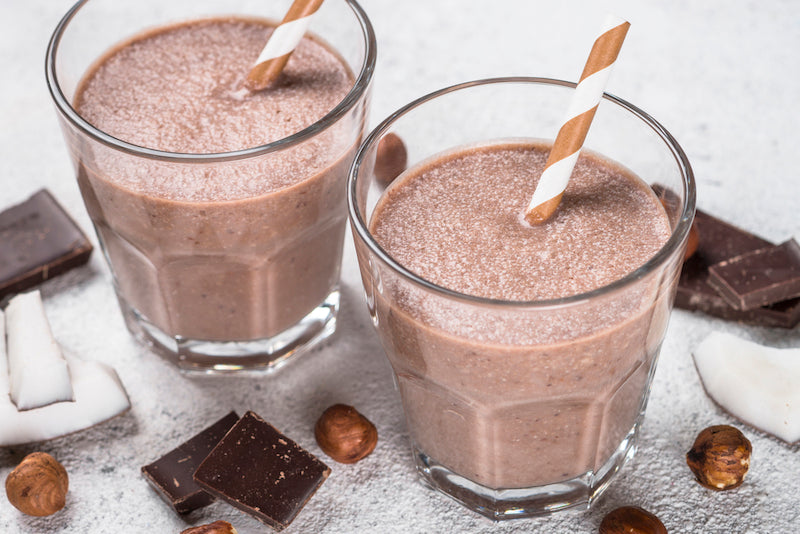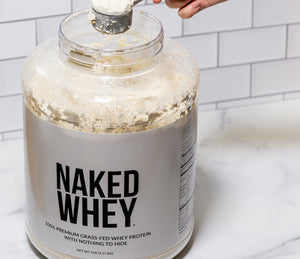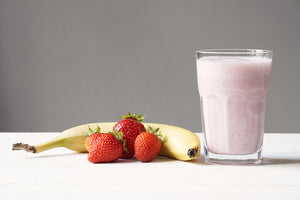Yes, whey protein is naturally gluten free, but that doesn't mean every whey protein powder available in the market is completely free from gluten.
If you're gluten intolerant, or following a gluten free diet as a preference, then you should avoid protein powders that could have come into contact with gluten during the manufacturing process.
Key Takeaways About Whey Protein and Gluten
-
Whey protein is naturally gluten free.
-
Certain whey protein powders may come into contact with ingredients with gluten during processing.
-
It is vital to look for whey protein powders with minimal ingredients processed in a contaminant-free environment.
Read on to learn more about how whey protein is made, different types of whey, and how to make sure your whey protein powder is gluten free.
How is Whey Protein Made?
Whey protein is a popular dietary supplement. It's commonly found in powdered form to easily mix into water, smoothies, or other liquids.
Whey protein is a product of milk. It can be easily separated during the process of making cheese.
Enzymes are added to the milk that separates the liquid into two products, curds and whey. Whey is the liquid product that is left over [1].
The liquid whey is then processed into a concentrated powdered form, which is what you find in the majority of dietary supplements on the market.
Is Whey Protein Gluten Free?
Pure whey, isolated from milk, is naturally gluten-free. Whether or not a whey protein product is gluten-free depends on the brand.
Protein powders can become contaminated with gluten during processing. This cross-contamination occurs when whey protein powders are processed in the same environment as other products, which themselves may contain gluten ingredients.
Some brands may also include ingredients such as flavorings and stabilizers in whey products that aren't gluten-free.
If you follow a gluten free diet because you suffer from Celiac disease, have a gluten allergy, or a gluten intolerance, it's vital to research your products thoroughly before purchasing, particularly if you have a severe gluten allergy.
A good indicator of whether a brand keeps its whey gluten free is if it contains the Certified Gluten-Free seal on the label, such as our grass-fed whey, Naked Whey.
Is Whey Concentrate Gluten Free?

You may see whey protein powders listed as whey concentrate. This means during processing it went through several steps to boost the protein content. A true whey protein concentrate is 80% protein and 20% carbohydrates and fat [2].
Whey protein concentrate is naturally gluten-free (but not necessarily ideal for lactose intolerance). The whey protein itself does not contain any gluten. However, as mentioned above, it depends on the product as some contamination can occur during the processing stages.
The more processed the product is, and the more additional ingredients, the higher the chance it will include gluten.
What About Whey Isolate?
Whey isolate is very similar to whey protein concentrate but it contains higher amounts of protein per serving. After processing, whey protein isolate contains 90% protein and only 10% carbohydrates and fat [2].
Whey protein isolate is also considered safe for gluten-free dieters if it is in its natural form.
Whether you choose whey protein concentrate or whey protein isolate, always check the ingredients and allergy list on the label. Look for the Certified Gluten-Free product seal to be certain you are getting a product that has not been contaminated with gluten.
How to Make Sure Your Whey is Gluten-Free

Aside from looking for the Certified Gluten-Free seal on the label for your whey protein powder, there are a few other steps you can take to ensure your product is truly gluten-free.
Allergy Information
The first place to look on a whey protein product to determine if it contains gluten is allergy information. According to the Food Allergen Labeling and Consumer Protection Act of 2004, all food and supplement products that contain any of the 8 major allergens (including wheat) must list them on their label [3].
This does not account for other gluten-containing products, such as rye, barley, or triticale.
Ingredients List
Next, read through the ingredients list thoroughly to weed out any potential gluten-containing ingredients. Common supplement fillers include wheat germ, food starch, maltodextrin, MSG, and textured plant protein, among many others. All of these products can contain gluten but they don't always.
Choose Protein Powders with Fewer Ingredients
Lastly, choose pure products. Avoid whey protein supplements that contain any other added ingredients. This can greatly reduce your chances of accidentally consuming gluten due to the higher risk of contamination with more ingredients added to a product.
It is important to note that just because a product states 100% pure protein on its label does not mean the product doesn't contain any other added ingredients. Always check the product package before purchasing.
Other Sources of Gluten-Free Protein

Aside from whey protein powder, there are many gluten-free protein sources. In fact, all proteins are considered gluten-free as long as they don't have anything else added to them.
Gluten-free proteins include:
-
Meat
-
Poultry
-
Seafood
-
Legumes
-
Nuts
-
Seeds
-
Pure soy products (edamame, tempeh, tofu)
Another gluten-free protein product is pea protein, a popular plant-protein alternative to whey.
Pea protein boasts a superior amino acid profile, making it ideal for post workout recovery.
Bottom Line on Whey and Gluten

In this post, we've addressed the question is whey protein gluten-free?
Although whey protein is naturally gluten-free, whether or not a protein powder product is gluten-free depends on the brand.
Don't trust the front of the package. Always thoroughly research your products by scanning the allergy and ingredients list.
If you are looking for a quick way to check, look for the Certified Gluten-Free seal on the product label.
Remember, just because whey protein is gluten-free doesn't mean every whey protein product is completely gluten-free. Most protein supplements contain added ingredients or artificial flavors that can contain gluten.
When these steps are taken, gluten-free dieters can enjoy the benefits of whey protein products like everyone else, without worry.










